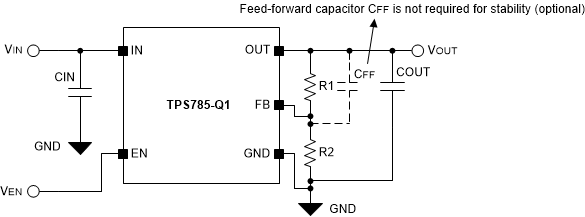SBVS388B January 2021 – January 2022 TPS785-Q1
PRODUCTION DATA
- 1 Features
- 2 Applications
- 3 Description
- 4 Revision History
- 5 Pin Configuration and Functions
- 6 Specifications
- 7 Detailed Description
-
8 Application and Implementation
- 8.1 Application Information
- 8.2 Typical Application
- 9 Power Supply Recommendations
- 10Layout
- 11Device and Documentation Support
- 12Mechanical, Packaging, and Orderable Information
8.1.3 Adjustable Device Feedback Resistors
The device requires external feedback divider resistors to set the output voltage. Figure 8-1 shows how the output voltage of an adjustable device can be configured from 1.2 V to 5.5 V by using a resistor divider network.
 Figure 8-1 Adjustable Operation
Figure 8-1 Adjustable OperationEquation 2 calculates the values of the R1 and R2 resistors to set the output voltage:
To disregard the effect of the FB pin current error term in Equation 2 and to achieve best accuracy, choose R2 to be equal to or smaller than 550 kΩ so that the current flowing through R1 and R2 is at least 100 times larger than the IFB current listed in the Electrical Characteristics table. Lowering the value of R2 increases the immunity against noise injection. Increasing the value of R2 reduces the quiescent current for achieving higher efficiency at low load currents. Equation 3 calculates the setting that provides the maximum feedback divider series resistance.